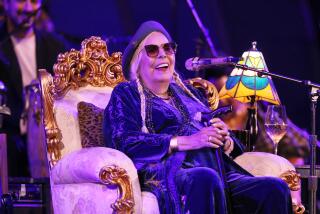WEEKEND REVIEWS : Music : Hangin’ In With Mozart, Mendelssohn at the Bowl
The surprises began with “The Star-Spangled Banner” Friday at Hollywood Bowl. The orchestra didn’t stomp out the obligatory martial strains in the twilight’s last gleaming. The audience didn’t sing along.
This was no ordinary ode to nationalism in the land of the free and the home of the brave. The ritual had to be different because Bobby McFerrin was in charge. Convention be damned. This was a night for experimentation, a night for taking liberties with the Los Angeles Philharmonic under the sweltering stars.
Our hero pro tem strolled onstage wearing casual black, a mike in hand and baton tucked behind the ear. He ascended the podium and proceeded to vocalize the Anthem, a cappella, with lots of linear embellishment, in an uncanny and unearthly scat-coloratura falsetto.
*
It was a personal statement. Pop was in and pomp was out. The bombs burst in air without bombast. The effect was terrific, and the assembled crowd of 9,147 seemed to love it. (The official attendance figure rose, we are told, to 13,336 the following night.)
Then the serious business began. It wasn’t very serious.
McFerrin--whose father Robert sang a distinguished Amonasro, Valentin and Rigoletto at the Met 40 years ago--led the shirt-sleeved musicians through a loud and brash, brisk yet competent approximation of the overture to Mozart’s “Le Nozze di Figaro.” Although the performance didn’t suggest a shotgun marriage, it didn’t seem a union made in heaven either.
Then, abetted by a resident bass accomplice, McFerrin did some engaging vamping until the concert grand could be rolled center stage for the D-minor Concerto, K. 466, of Mozart. Call him Wolfie. Bobby did.
The crossover conductor brought a jazzy buddy along for the occasion: pianist Chick Corea. We don’t know what Wolfie ever did to Chick. We do know now what Chick did to Wolfie. It wasn’t pretty.
The stranger in this classical paradise did a lot of assertive noodling and doodling, a lot of grotesque pounding and blurring, a lot of thumping and pumping. Also a lot of digital bumping and grinding. One had to admire his guts and his stamina, if not his style.
Corea also mustered a lot of imaginative ornamenting, in wildly anachronistic cadenzas and in innocent passages of melodic exposition. In so doing, he was vaguely following the dictates of 18th-Century performance practice. Unfortunately, he wasn’t playing by the historical rules.
The quasi-Mozartean interpretation was often interrupted by applause sanctioned--no, encouraged--by McFerrin in his pre-performance chat.
“Feel free to hang in there,” the maestro instructed. The obedient listeners did that literally to a fault, at odd intervals.
In Corea’s unaccustomed hands, the noble concerto emerged clunky and crazy, showy and tough. The pianist, who recently ventured similar service in San Francisco and Italy, ignored all traditional opportunities for grace, elegance, pathos and subtlety. He was imaginative--give him that. In context, however, his imagination seemed willful and even perverse.
McFerrin was content to beat time in the background. Efficiently. Nonchalantly.
Never mind. Mozart will survive. We hope.
*
As an encore of sorts, the stellar protagonists dismissed the Philharmonic and improvised a 17-minute two-man jam session. Corea fiercely plucked the innards of his Steinway. McFerrin chirped stratospheric ditties into his microphone. Both fellows did a lot of joyous tapping and strutting.
At one mock-portentous point, the singer took over the ivories while the erstwhile keyboard specialist ascended to the timpani platform for a nifty send-up of “Also Sprach 2001.”
“You’re a swingin’ cat, man,” McFerrin told Corea in a moment of delirious syncopation.
For better or worse, the virtuosos were in their element here. The jazz interlude was fun. Ask not what it had to do with a symphony concert.
After intermission, a more subdued McFerrin returned to lead the Philharmonic in a pleasant, monochromatic dash through Mendelssohn’s “Italian” Symphony.
For reasons not quite clear, he warned the throng at the outset that reverence was now mandatory. Silence, he announced, should prevail, even between movements.
Fat chance. By this time, the audience was irrevocably conditioned to be clap-happy, come what may.
The swingin’ cats out front were hangin’ in there.
More to Read
The biggest entertainment stories
Get our big stories about Hollywood, film, television, music, arts, culture and more right in your inbox as soon as they publish.
You may occasionally receive promotional content from the Los Angeles Times.










